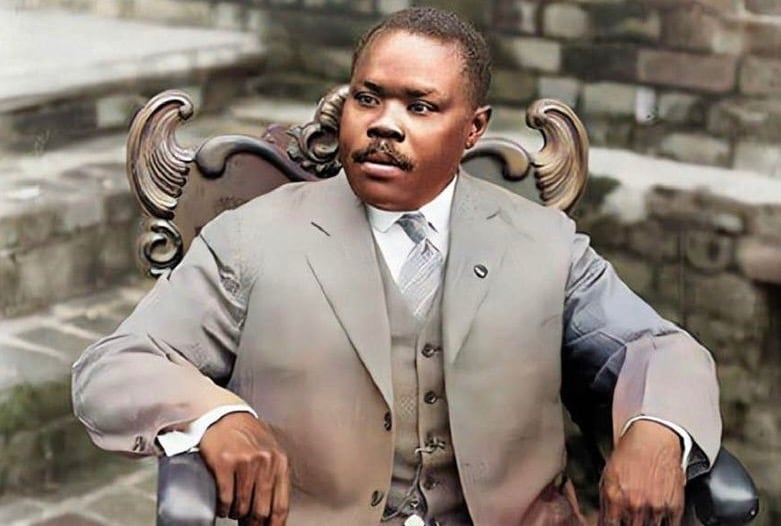Marcus Garvey and the Forgotten Movement
UNTOLD, HIDDEN, OMITTED HISTORY
9/4/20253 min read


Marcus Garvey and the Forgotten Movement
by Maurice Woodson
In the early 20th century, when segregation, lynching, and white supremacy defined Black life in America, Marcus Garvey dared to articulate a radical alternative: pride, power, and global unity. His Universal Negro Improvement Association (UNIA) became the largest mass movement of Black people in the world, reaching millions across the United States, the Caribbean, Latin America, and Africa. Yet despite his influence, Garvey’s name rarely carries the same recognition as Martin Luther King Jr., Malcolm X, or W.E.B. Du Bois. His vision, however, laid much of the philosophical and cultural groundwork for the modern Civil Rights Movement and the broader global fight for Black liberation.
The Birth of a Movement
Born in Jamaica in 1887, Marcus Mosiah Garvey witnessed the social and economic struggles of Black people both in the Caribbean and abroad. Migrating to the United States in 1916, he saw firsthand the entrenched racism of Jim Crow America. Out of this, Garvey built the UNIA, headquartered in Harlem, New York. At its height in the 1920s, the organization claimed millions of members and boasted its own businesses, newspapers, and even the ambitious Black Star Line shipping company, designed to connect people of African descent worldwide.
Garvey’s message was electrifying: Black people must define their own destiny, control their own economies, and reclaim their African heritage. He preached a gospel of racial pride at a time when mainstream society demeaned Blackness, and his boldness inspired a generation to think beyond the narrow confines of white supremacy.
Pan-Africanism and Black Nationalism
Garvey’s philosophy fused two powerful ideas. Pan-Africanism emphasized the shared heritage of all people of African descent, regardless of where they lived. Black Nationalism underscored the need for self-sufficiency, community building, and independence from white-dominated institutions. Together, these principles formed a blueprint for liberation that transcended borders.
Through fiery speeches, parades, and the widely read Negro World newspaper, Garvey spread a message of global solidarity. He challenged Black people not just to survive within oppressive systems, but to build alternatives—schools, businesses, and eventually, nations—that reflected their own values and aspirations.
Influence on the Civil Rights Era
Though Garvey’s movement declined after his imprisonment on controversial charges and the eventual collapse of the Black Star Line, his ideas reverberated through the decades that followed. Leaders of the Civil Rights and Black Power eras, from Malcolm X to Kwame Ture (Stokely Carmichael), drew directly or indirectly from Garvey’s call for pride, unity, and self-determination.
Malcolm X’s father was a Garveyite preacher, and the Nation of Islam’s separatist economic philosophy carried Garvey’s imprint. The Black Panthers’ focus on community survival programs echoed Garvey’s emphasis on self-sufficient institutions. Even Martin Luther King Jr., while rejecting separatism, embraced the spirit of racial pride and global solidarity that Garvey had articulated decades earlier.
The Legacy We Forgot
Why, then, is Garvey’s movement so often overlooked in mainstream historical narratives? Part of the answer lies in the controversy that surrounded him. Garvey clashed with other Black leaders of his time, including Du Bois, and his overtures toward Black separatism—and even, controversially, negotiations with white supremacist groups who supported the idea of racial separation—alienated some. His grand ambitions, like the Black Star Line, were undermined by mismanagement and targeted by federal surveillance.
Yet to reduce Garvey to these controversies misses the magnitude of his contribution. He was the first to mobilize millions of Black people under a banner of pride in African heritage, the first to demand a global perspective on liberation, and the first to insist that Black freedom required not mere integration, but power.
Why Garvey Matters Today
In an era when systemic racism continues to shape opportunity, and when diasporic communities seek to reclaim cultural identity, Garvey’s ideas remain strikingly relevant. His vision reminds us that liberation is not simply about fitting into existing systems, but about imagining—and building—new ones rooted in dignity, self-respect, and unity.
Marcus Garvey’s movement may be “forgotten” in the popular imagination, but it continues to live in the activism, scholarship, and cultural pride of Black communities worldwide. To revisit Garvey is to remember that the struggle for freedom is global, interconnected, and deeply rooted in the belief that Black lives, histories, and futures matter.
